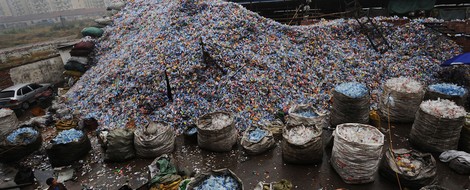Your podcast discovery platform
Curious minds select the most fascinating podcasts from around the world. Discover hand-piqd audio recommendations on your favorite topics.

piqer for: Globalization and politics Climate and Environment Technology and society Boom and bust
Cristina is a Spanish journalist based in London, she holds master’s degree in Journalism, Media and Globalisation at City University London and Aarhus University (Denmark). She has a keen interest in sustainable development and human rights and she curates -mostly- stories related to the Sustainable Development Goals. She has previous worked for United Nations and now collaborates with various publications such as El País, Chatham House, Huffington Post, Equal Times or eldiario.es.
China Won't Accept The World's Plastic Waste Anymore — What Now?
Since 1992 until last January, China has imported 45 percent of the world's plastic waste. The waste has come in its vast majority (90%) from high-income countries. The European Union, North America and Japan were the biggest exporters. It was easier and cheaper to send trash overseas than to deal with it. But China has said enough! Now, relying in other clients like currently Malaysia or Vietnam is not really a long-term option, since various countries in the region that have already experienced an increase in plastic waste imports are already looking to enforce bans of their own.
This paper published last week in Science Advances explores the global impact of the plastic ban, puts it in context and provides some recommendations. After analysing United Nations data from 1988 to 2016, one of their main findings is that non-reusable plastics are the big source and thus is there is huge room for improvement in that area. Indeed, plastic products should be better designed for recyclability and at the same time better domestic recycling infrastucture is needed.
The author believes this should be taken as a “wake up call to push push the plastics circular economy”.
As 89% of historical exports consist of polymer groups often used in single-use plastic food packaging (polyethylene, polypropylene, and polyethylene terephthalate), bold global ideas and actions for reducing quantities of non-recyclable materials, redesigning products, and funding domestic plastic waste management are needed.You can also find the press coverage from Associated Press or the Washington Post.

Source: Amy L. Brooks, Shunli Wang and Jenna R. Jambeck Image: Getty Images advances.sciencemag.org